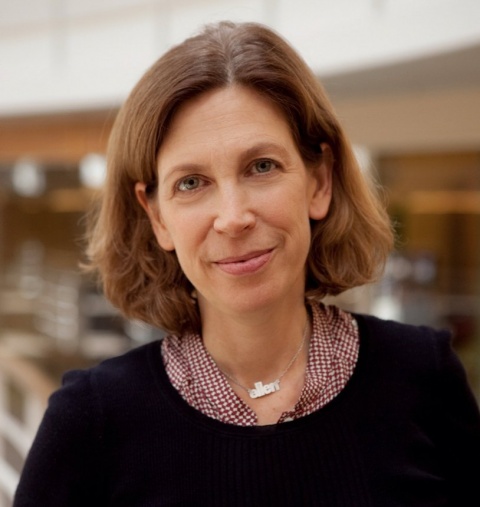Media advocate Ellen Pack’87, BUS’90 is here to ease parents’ minds about this growing pandemic concern.
Columbia College | Columbia University in the City of New York
Media advocate Ellen Pack’87, BUS’90 is here to ease parents’ minds about this growing pandemic concern.

ILLUSTRATION BY DAVIDE BONAZZI
“Don’t beat yourself up about screen time. Do what you need to do to get through the day.”

Ellen Pack ’87, BUS’90
I’d wanted to interview Pack since learning that she was president of Common Sense, back in January 2020. At the time I knew the nonprofit mainly for its impressively researched movie and television reviews, which — as the mom of a 3-year-old girl — I’d just begun using to search for shows beyond Sesame Street and Daniel Tiger’s Neighborhood that I was comfortable with her watching. Then came Covid-19. In what felt like a blink, by the time I actually scheduled a conversation, it was January again. In 12 months the scope and complexities of the difficulties faced by families — from filling canyons of free time, to managing distance learning, to dealing with the personal ramifications of the national health and economic crises — had increased exponentially.
“Parents all have very challenging circumstances,” Pack says, “whether you’re working, depending on how connected your kids’ school is and how it’s handling everything. We need the release of entertainment, plus we need our screens right now for a lot of things. And depending on the local lockdown rules or your work schedule, you don’t have all the opportunities that you used to have.
“‘Balance’ is the word Common Sense would use in this,” she adds. “There are a lot of positive things that come from some of these [media] environments, and then there are things you want to be careful of. As long as you’re tuned in with your kids a little bit — and talk to them about what they’re watching as much as you can — that’s a pretty good place to be.”
If any organization was built to help families manage our ever-changing landscape, it was Common Sense. The nonprofit was founded in 2003 with an acute awareness of how media and technology were transforming childhood, and a mission to help parents navigate those uncharted waters. Consider that around the corner was the founding of YouTube in 2005 and Twitter in 2006; that same year, Facebook opened its membership to kids as young as 13. Netflix’s streaming service and the iPhone both arrived in 2007.
Beyond Common Sense’s herculean review system — its website has more than 38,000 entries and counting — it offers an array of resources for educators. These include its flagship K–12 “digital citizenship” curriculum, which instills the fundamentals of being safe, responsible and ethical online. Taught in 84,000 schools nationwide, topics range from managing your privacy and digital footprint, to cyberbullying, to news and media literacy. Common Sense also conducts related research — its annual census on kids’ media use promises to reveal a before-and-after snapshot of the pandemic’s effects — and has a lobbying arm that creates public service campaigns and supports legislation in support of kids’ digital well-being.
When schools began closing last March, Pack says, Common Sense’s leaders recognized that its often distinct audiences of parents and educators had suddenly become one community with a shared challenge. “Parents had to become teachers, and the schools were not prepared,” she recalls. “It wasn’t like they had remote learning platforms that they could suddenly flip on with a switch.” Within five weeks, Common Sense had created WideOpenSchool.org — a collection of equity-focused, free learning resources to support and enrich distance learning. A tour through the site finds activities organized by grade and subject; they address traditional academic areas, as well as emotional well-being, Black history and culture, English-language learning and more.
When schools began closing last March, “parents had to become teachers, and the schools were not prepared.”
Common Sense’s advocacy work also took on new urgency, as families dealt not only with the pandemic’s repercussions but also with an activated racial and social justice movement, and an atmosphere made toxic by the politics of the presidential election. In early November, the nonprofit released an updated tech agenda that read largely like a referendum on the prior 10 months. Among its pillars was a commitment to hold social media accountable for limiting kids’ exposure to racism, hatred and inappropriate ads, and to require stronger content moderation to protect “children, families, and our democracy.”
Perhaps most ardent are Common Sense’s calls for closing the digital divide — shorthand for the gulf between those with access to the internet, computers and other devices, and those without. “There are 16 million kids in the U.S. being left behind right now, they can’t even have remote school; they don’t have the connectivity to be connected,” Pack says. “As the pandemic drags on longer and longer, we’re going to have a generation where we have to figure out how we are going to recover from the learning loss that they’re experiencing.
“Before, we’d talk about the homework gap, with kids doing homework on these” — Pack waves her phone — “significant, high school-level homework, because they didn’t have adequate technology at home. Or kids sitting outside libraries and other places, using their wi-fi. And that [phenomenon] has become so clear and exaggerated during the pandemic. What’s going to happen to those 16 million kids if we don’t get them connected? We have to; it’s not even optional. This is key to the future of our country.”
Pack’s road to Common Sense traveled for nearly two decades through the for-profit world. A Westchester native (and a member of the College’s first fully coeducational class), she joined a Tribeca-based tech startup after business school, only to have the company pack up and head for Palo Alto “because that’s where all the VCs were.” Silicon Valley in the early 1990s was the vanguard of the online movement, Pack notes, and she became intrigued. “I’d talk to my New York friends about it, and they were like, ‘Online — what are you talking about? That’s crazy.’”
In 1992 Pack founded Women.com, which became one of the most popular destinations for women during the first internet wave. The site was part networking community, with email, chat rooms and forums, and part content provider; among its partnerships was a deal with Hearst Publications to post articles from Cosmopolitan, Good Housekeeping, Harper’s Bazaar and others. At its peak the site counted six million visitors a month. The company went public in 1999 and was acquired by iVillage in a widely reported merger in 2001.
Pack left the company around that same time; she bought and ran a home-staffing agency in the Bay Area, and later led marketing at Elance (now the freelancer marketplace Upwork) until 2011. After realizing she was ready for a turn away from the startup scene, she discovered an interest in education. She joined Common Sense in 2013. “We all bring our own purpose to our work,” Pack says, “but there is something really amazing about working for a brand that’s independent and doesn’t answer to anybody but our core values and our audience.” Operating through a lens of diversity, equity and inclusion is key to the company’s ethos. “We want to make sure we are serving all,” Pack says.
Though Pack is involved in every aspect of Common Sense, her day-to-day purview includes its research program, education work, and the cornerstone ratings and reviews, which extend to books, video games and YouTube channels. The method is more Consumer Reports than New York Times criticism, employing guidelines that are research-backed and child developmentally based. Detailed sections let parents know what to expect in areas like educational value, violence and scariness, and “sexy stuff” — all of it headlined by a traditional star rating for quality, and an age rating to indicate the youngest appropriate age for the viewing experience.
Pack points as well to a section featuring questions that promote discussions with kids. (To be honest, it’s also pretty good at helping adults rethink their own childhood favorites.) “Why are the stepsisters ugly and Cinderella pretty?” Why do you think Ariel chooses to give up her voice (and her family) for Eric in The Little Mermaid?” The conversation starters reinforce a Common Sense philosophy: The goal is not to cover kids’ eyes, but to teach them to see.
“There is a lot of content out there, and plenty of good stuff to watch on every platform. That’s where we try to focus,” Pack says. “Educating families about what’s out there really does make a difference.
“Generally, you want kids to have a healthy diet of good media, just like you want healthy nutrition,” she continues. “Media has such an opportunity to help build character, to educate our kids about things like race. And every piece of media — good, bad, even some of the stuff you kind of wish wasn’t there — is an opportunity for media literacy and for conversations.”
Our own conversation has never wandered far from the pandemic, and as we wind down, Pack is again thoughtful about bringing the bigger picture into view. “So much has been disrupted,” she says. “The social isolation for kids is really hard, and then the families whose kids have been impacted by Covid directly. Just imagine what those kids are going through. There are so many aspects of this: the economic stresses, the school closures, the health crisis, the racial justice movement. You pile all that in and you say, ‘Screen time?’ That might not be the most urgent concern in the current environment.”
If we take anything from this experience, Packs adds, “I hope it’s better understanding and appreciation for the big problems we need to come together to solve. We all are on the same side in terms of wanting what’s best for our kids.”

Published three times a year by Columbia College for alumni, students, faculty, parents and friends.
Columbia Alumni Center
622 W. 113th St., MC 4530, 6th Fl.
New York, NY 10025
212-851-7852
cct@columbia.edu

Columbia Alumni Center
622 W. 113th St., MC 4530, 4th Fl.
New York, NY 10025
212-851-7488
ccalumni@columbia.edu